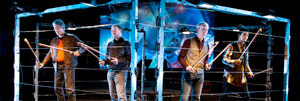by Daniel Hathaway
“Eclectic”
In their wide-ranging program in Gartner Auditorium of the Cleveland Museum of Art on January 18, the Kronos Quartet offered compelling performances of works by Bryce Dessner, Ram Narayan, Dan Becker (a first performance), Laurie Anderson, Steve Reich, Omar Souleyman and Aleksandra Vrebalov, plus arrangements of Vietnamese and Swedish tunes, to a large and rapt audience.
Subtly amplified and visually enhanced by club-like lighting themes and projected gobo patterns, Kronos’s playlist was anchored by ambitious pieces that ended each half of their two-hour program, each of which revisited traumatic national events by mixing recorded documentary with live sounds.
The most successful, Serbian composer Aleksandra Brebalov’s ...hold me, neighbor, in this storm…, recalled the recent history of the Balkan countries through the sounds of church bells, folk music, Islamic calls to prayer, and ethnic instruments (the gusle and tapan). As Brebalov described the piece in her program notes,
“It is a way to piece together our identities fractured by centuries of intolerance, and to reach out and celebrate the land, so rich in its diversity, the land that would be ashen, empty, sallow, if any one of us, all so different, weren’t there.”
The rich-textured collage, commissioned for Kronos by Carnegie Hall and the Clarice Smith Center, held attention throughout its 20-minute duration. Recorded sounds were woven seamlessly into the texture of the live music, and Harrington and Sherba exchanged their fiddles for meaningful passages on the gusle (a bowed single-string instrument) and tapan (a double-headed drum played with sticks).
Steve Reich’s WTC 9/11, commissioned by Kronos for the tenth anniversary of the World Trade Center disasters, was more successful in concept than execution. The intermeshing of live and recorded string quartet music with recorded documentary (the “off-hook” tones of a telephone; the voices of NORAD air traffic controllers, New York Fire Department dispatcher, first responders and neighborhood residents; the ritual chants and songs of women, a rabbi and a cellist) depends on the listener being able to hear what the voices have to say. On Friday evening, most of the speech was unintelligible, and the composer’s use of the strings to “double and harmonize the speech melodies and prolonged vowels or consonants of the recorded voices” didn’t really come across.
The concert began with a vigorous, minimalist work, Bryce Dessner’s Aheym or Homeward, written for a Kronos concert in Prospect Park in Brooklyn, “a musical evocation of the idea of flight and passage” based on recollections of conversations with the composer’s grandmother, who fled to the U.S. From Poland. Earbuds apparently connected to a clicktrack kept the Kronos masterfully together during the long stretches of repetitive rhythmic patterns. The piece relaxed in mid-flight for a slower section with poignant solos.
Ram Narayan’s Raga Mishra Bhairavi: Alap featured John Sherba on the north Indian sarangi, a bowed instrument with attractively jangly, sitar-like timbres. Dan Becker’s Carrying the Past evoked memories of his grandfather, Eddie Sandson, through 78 recordings of his trumpet playing with 1920s big bands interleaved and commented on by Kronos. Before the Reich, Kronos played Laurie Anderson’s Flow, the final song on her Nonesuch album, Homeland, lovingly and almost inaudibly in an arrangement by Jacob Garchik.
After intermission, Kronos lightened the proceedings with two more Garchik arrangements: a funny Syrian wedding song, Omar Souleyman’s I’ll Prevent the Hunters from Hunting You, complete with dueling violins and a “Hey!” at the end; and the exotic Vietnamese song, Running Water. A third entremet featured a wistful performance of the traditional Swedish tune, A Thousand Thoughts (of unrequited love), covering a version by the folk band Triakel.
Though Kronos’s program as a whole chose variety over any kind of unifying narrative, the procession of works in wildly different genres on a single concert made for its own kind of sense. The quartet’s ability to change styles on a dime and play all these musics with equal agility and dedication is quite amazing. The encore, a lovely Greek love song by Marika Papagika, further extended their reach.
One suggestion for the hosts: if you give the audience a 20-page program with detailed notes to follow, please keep some dim lights on during the show!
Click here to comment on this article. All comments will be moderated by the editorial staff.
Published on ClevelandClassical.com January 22, 2013
Click here for a printable version of this article.


